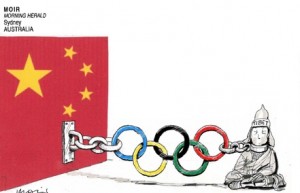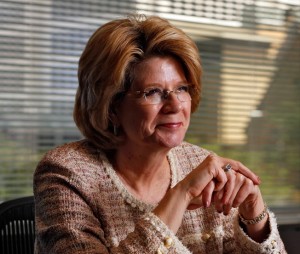Diana Anahi Torres-Valverde writes: For miners, investors, and artisans, few things are more precious than gold. But for human life itself, nothing is more precious than water.
Nearly 30 years ago, the Wisconsin-based Commerce Group Corp purchased a gold mine near the San Sebastian River in El Salvador and contaminated the water. Now, according to Lita Trejo, a native Salvadoran and school worker in Washington, DC, the once clear river is orange. The people who drink from the arsenic-polluted river, she says, are suffering from kidney failure and other diseases.
On September 15, Trejo and more than 200 protestors—including Salvadoran immigrants, Catholic priests, trade unionists, and environmentalists—gathered in front of the World Bank to support El Salvador’s right to keep its largest river from suffering the same fate as the San Sebastian River. The event was co-sponsored by a raft of organizations, including the Institute for Policy Studies, Oxfam America, the AFL-CIO, the Teamsters, Friends of the Earth, the Sierra Club, and the Council of Canadians, among others. Over the past few weeks, similar protests have taken place in El Salvador, Canada, and Australia.
Mining for gold is not nearly so neat and clean as the harmless panning many Americans learned about as kids. Speakers pointed out that gold mining firms use the toxic chemical cyanide to separate gold from the surrounding rock, which then leaches into the water and the soil. And they use large quantities of water in the mining process—a major problem for El Salvador in particular, which has been described as “the most water-stressed country in Central America.” Confronted by a massive anti-mining movement in the country, three successive Salvadoran administrations have refused to approve new gold mining operations.
An Australian-Canadian mining company, OceanaGold, is suing the Salvadoran government for refusing to grant it a gold-mining permit to its subsidiary, Pacific Rim. Manuel Pérez-Rocha, a researcher at the Institute for Policy Studies, explained the situation: “Oceana Gold is demanding more than $300 million from El Salvador. They are saying, ‘If you do not let us operate in your country the way we want, you must pay us for the profits that you prevented us from making.’”
El Salvador is now defending its decision to prevent Oceana Gold/Pacific Rim from operating the “El Dorado” mine near the Lempa River before the International Center for Settlement of Investment Disputes, a little-known World Bank-based tribunal.
As several protesters pointed out, El Salvador’s decision is grounded in its need to protect its limited water supply. More than 90 percent of the surface water supply in El Salvador is already contaminated, and more than 50 percent of the country’s 6.3 million people depend on the Lempa River watershed for their water.
John Cavanagh, Director of the Institute for Policy Studies, explained the goal of the protest: “We are saying to OceanaGold: ‘Drop the suit. Go home.’ To the World Bank, we say: ‘Evict this unjust tribunal. It deepens poverty and stomps on democracy and basic rights.’” Cavanagh pledged to continue pressing the company to back down, promising that protesters would return to the World Bank in larger numbers when the tribunal makes its ruling in 2015.










